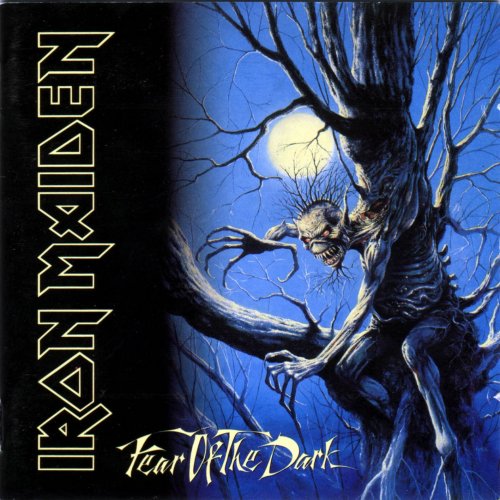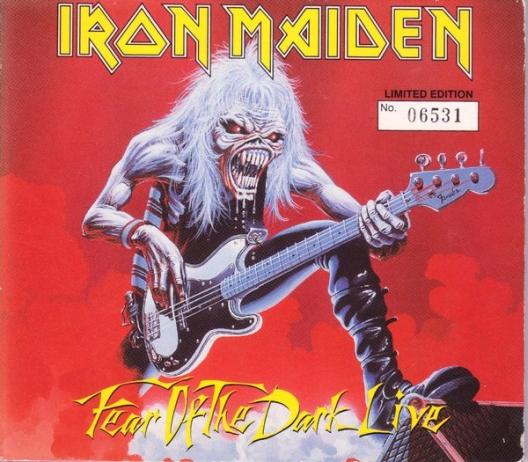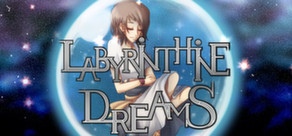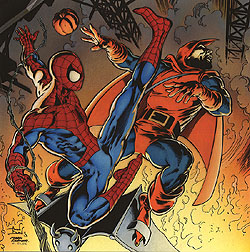
Fear of the Dark (1992)
It's hard to decide whether this album is better or worse than No Prayer For The Dying. While the previous album was consistently average, there are some songs on here that are stunning and emotional, examples of Iron Maiden at their best. On the other hand, some songs on Fear of the Dark are just awful, far worse than anything on the last album and indeed among Iron Maiden's absolute worst. This set of tracks is jaw-droppingly inconsistent - you'll literally hear a masterpiece followed by a disaster followed by more greatness...call it musical whiplash.
There's a lot of experimentation going on in Fear of the Dark which may attribute to its inconsistency...there are a lot of unique sounds on here that the band had not really tried in the past. Another reason could be the turmoil within the band itself. Singer Bruce Dickinson left the band after this album to pursue a solo career, leaving Iron Maiden's future in doubt.
"Be Quick or Be Dead" is awesome for about 20 seconds, and then Bruce starts with the verses. Yes, he's still got that insufferable raspy style from the last album and it's even more unwelcome. Sometimes it sounds like he's about to cough up a hairball. It's really a shame, because the instruments are on fire and the satirical lyrics are pretty effective. There are some really bad songs on this album, but this one should have been good.
"From Here to Eternity" seems to be Iron Maiden auditioning to be an AC/DC tribute band, complete with Bruce's bad impression of Brian Johnson. It's kind of impressive how well they nailed that AC/DC sound, but you can't help but wonder why. Sure, AC/DC gave us some hard rock classics, but Iron Maiden's in a whole different league. Lyrically, it's just terrible. Charlotte the Harlot has returned once again, though this is the end of her tale as she and her motorcycle riding boyfriend take a wrong turn off a cliff and die. Most of the song is just annoying puns about motorycle parts and it's really just dumb.
Anyone ready to give up on the album is about to get blindsided by the stunning "Afraid to Shoot Strangers," a powerful story of a soldier's anxiety about having to murder another human being. Sure, he might be "ready to die," but to take another life is different. He tries to reassure himself with the typical platitudes offered by politicians ("there's no other way"), but that doesn't seem to bring him much comfort. After the gentle introduction, one of Iron Maiden's all-time best riffs kicks in at about 2:45. There's so much emotion in this guitar playing that it brings home the tragedy of the subject matter more than the lyrics themselves and really has to be heard to be believed. Then the song explodes into a faster section, probably to mirror the soldier's descent into war. The brilliant riff returns for the finale, a beautiful ending to a masterful song.
That song demonstrates that Iron Maiden is very good at using their music to drive home social and political commentary, but "Fear is the Key" is a grevious exception to that rule. The song is about the AIDS virus, but instead of a powerful statement about the issue, it winds up sounding like an incoherent blog entry written by someone with a visceral need to just complain without any overriding point. The song laments how paranoia about AIDS made youngsters frightened of sex ("I remember a time we thought that passion was free") but at the same time, chastises the public for not showing enough concern about the disease ("nobody cares until somebody famous dies.") Which is it, fellas? We can't suck for both of these reasons at the same time, so pick one. It's a mess lyrically and what's worse, the plodding song is just tedious to listen to.
The whiplash continues with the devastating "Childhood's End," an elegy for starving children that hits the listener like a ton of bricks out of nowhere. Opening with one of the best introductions in Maiden's entire discography, this song is just phenomenal on all the instruments, especially Nicko's drumming. Even Raspy Bruce can't take anything away from it's power, and you might find yourself eager to donate to charity after the first time you hear it. "Will we learn someday?" I hope so.
 "Wasting Love" is unique in the Maiden catalogue for being a fully traditional power ballad. Unlike many of the band's more heartfelt material, there's no galloping section at the end to bring the song to a fast conclusion. It's a sensitive tune filled with yearning and Bruce wisely cleans up his vocals to powerful results. Good luck resisting that sing-along chorus.
"Wasting Love" is unique in the Maiden catalogue for being a fully traditional power ballad. Unlike many of the band's more heartfelt material, there's no galloping section at the end to bring the song to a fast conclusion. It's a sensitive tune filled with yearning and Bruce wisely cleans up his vocals to powerful results. Good luck resisting that sing-along chorus.
"The Fugitive" is based on the classic TV show and film adaptation of the same name. The rumbling drums do a fantastic job conjuring up the suspenseful atmosphere that the story is known for, and the song is strong enough musically to make up for the somewhat simplistic lyrics. "Chains of Misery" is a catchy, fun song that evokes some hair metal cheese, but not in a bad way at all. The song was co-written by guitarist Dave Murray, who typically is not as involved as the other band members when it comes to composition. The very strong guitar in this song is a good reason to give him a vote of confidence.
"The Apparition" is an odd song that winds up being fairly unmemorable. Lyrically, it seems to be a motivational speech given by a ghost. It's not bad at all, and it does have a cool middle section. I especially like the random little riff between 1:48 and 1:57, though. Sounds kinda like old-school Nintendo music. "Judas Be My Guide" is quite popular with fans, and it's easy to see why. Filled with blazing guitar work and only about three minutes long, it's a fast and furious piece of metal. "Judas" seems to refer to a person's inner urges to cause trouble, and adds a bit of irony since the song itself reminds me of Judas Priest...but maybe that's just the title's influence.
Well, we were having a good run until we hit "Weekend Warrior," which I seriously think is the worst Iron Maiden song of all-time. In the same album as songs about poverty and war, the band decided to write a six-minute tirade against...assholes at soccer games. Oh sorry, football. The band must have had a REALLY unpleasant experience at the stadium. The song is unbelievably tedious, Bruce's vocals are a mess, and it just feels like a massive waste of time. Gah, get that shit out of here, because it's time for...
 "Fear of the Dark." That's right, the worst Maiden song is followed immediately by one of the all-time best. I heard this piece of metal perfection long before the rest of the album, and it was love at first listen. With its blazing riffs and phenomenal vocals, the song is all the evidence you need that even the worst internal turmoil can't keep this band from producing excellence. The lyrics are exactly what you expect from the title - a charming, unpretentious discussion of a timeless, primal fear. The fandom embraced this song immediately and it has endured over the years as a staple of live shows, where the crowd sings along to the guitar melodies to haunting effect. The band has put out six albums since 1992, but this song is guaranteed to be played at almost any Maiden concert. And so, an album with a LOT of ups and downs ends on a brilliant high note.
"Fear of the Dark." That's right, the worst Maiden song is followed immediately by one of the all-time best. I heard this piece of metal perfection long before the rest of the album, and it was love at first listen. With its blazing riffs and phenomenal vocals, the song is all the evidence you need that even the worst internal turmoil can't keep this band from producing excellence. The lyrics are exactly what you expect from the title - a charming, unpretentious discussion of a timeless, primal fear. The fandom embraced this song immediately and it has endured over the years as a staple of live shows, where the crowd sings along to the guitar melodies to haunting effect. The band has put out six albums since 1992, but this song is guaranteed to be played at almost any Maiden concert. And so, an album with a LOT of ups and downs ends on a brilliant high note.
_______________________________________
Overall Strengths: Certainly not a flawless album, but there is some brilliant stuff here, especially the title track.
Overall Weaknesses: The expression "mixed bag" feels inadequate. Some of these songs are just painful.
Recommended Tracks
Afraid to Shoot Strangers
Childhood's End
Wasting Love
Fear of the Dark
Next: With a new singer at the forefont, Iron Maiden changes forever with "The X-Factor."








